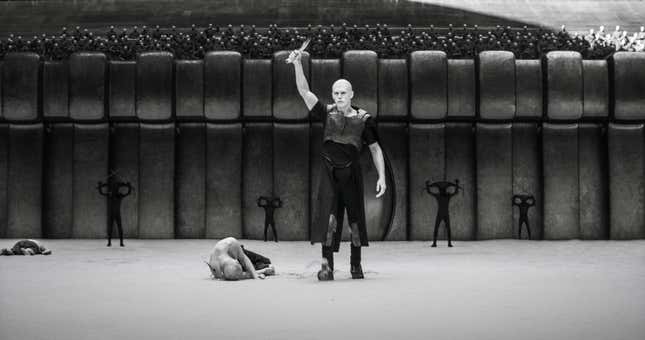
Denis Villeneuve’s Dune movies are visually striking—cinematographer Grieg Fraser and production designer Patrice Vermette already have Oscars from Dune: Part One. But Dune: Part Two is even bolder, and includes a black-and-white sequence that leaves a lingering impact.
Speaking with Variety, Fraser explained how the interlude—the climax of which showcases the gladiatorial prowess of Feyd-Rautha (Austin Butler) as Baron Harkonnen (Stellan Skarsgård) and others on Giedi Prime look on—came into being. Initially, the idea to shoot in black-and-white came from Villeneuve, who thought the sandy surroundings of the fighting ring would be too evocative of the film’s main setting of Arrakis otherwise. Fraser upped the ante by using a camera modified to shoot in infrared, a technique he’d used previously in Zero Dark Thirty and Rogue One: A Star Wars Story “All the camera could see was infrared, and that became their world,” he told the trade. “My fascination with infrared started because our eyes can’t see [certain things], but the camera can.”
The Giedi Prime sequence also required special work from the wardrobe department (costume designer Jacqueline West, whose work on Part One was Oscar-nominated, had to adjust her approach to make sure all the Harkonnen outfits looked properly black in the unusual lighting), and returning production designer Vermette had to think creatively—citing “septic tanks” as one surprise inspiration—when bringing the Harkonnen planet to life.
Head to Variety for the full piece, which also explores how Dune: Part Two’s editor, Joe Walker (another Dune: Part One Oscar winner) worked with Villeneuve to make the fight scene as thrilling as possible, and yet in no way resemble “a modern sporting event,” particularly in the way its spectators sound as they’re reacting to its spectacle.
Dune: Part Two is in theaters now.
Want more io9 news? Check out when to expect the latest Marvel, Star Wars, and Star Trek releases, what’s next for the DC Universe on film and TV, and everything you need to know about the future of Doctor Who.

